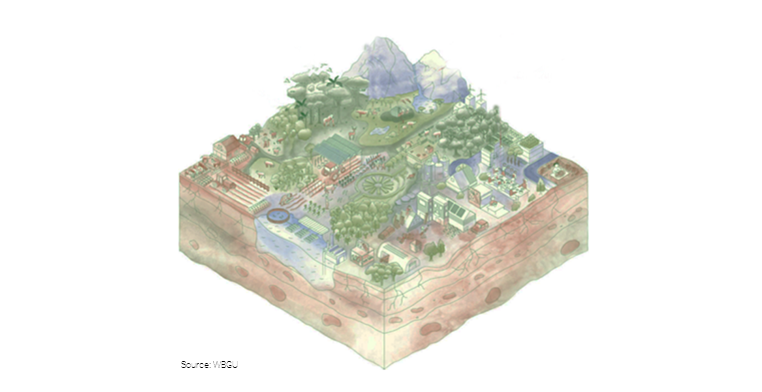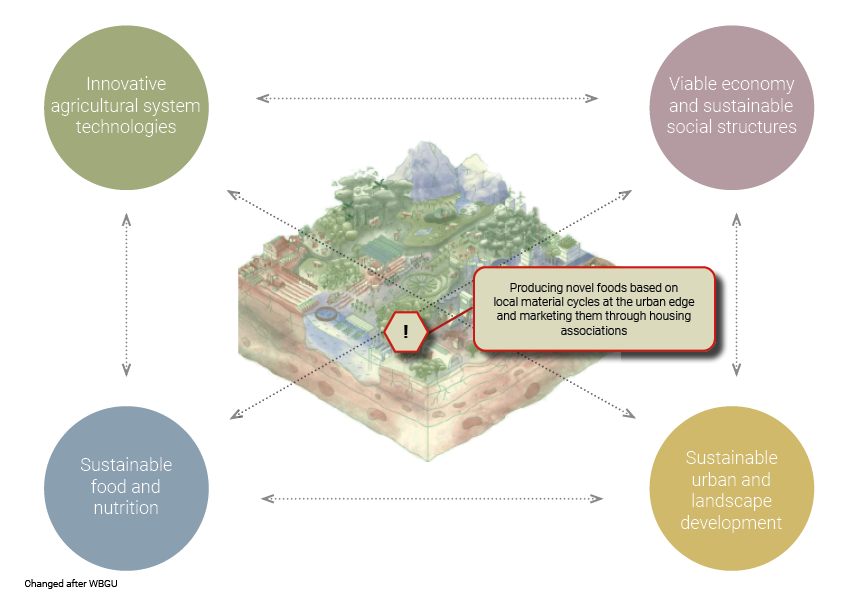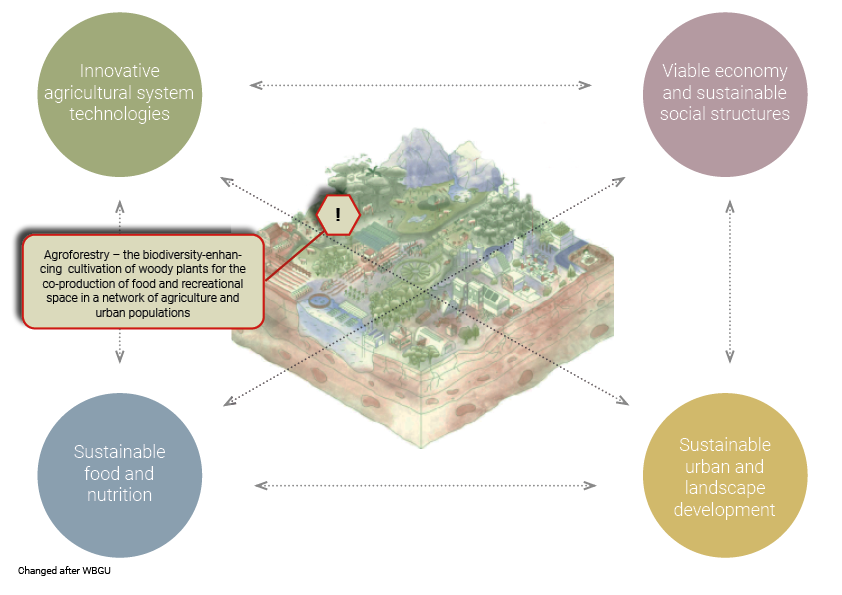Our Idea – Rethinking Land in the Anthropocene
Our Idea – Rethinking Land in the Anthropocene at the Faculty Agricultural Sciences and Landscape Architecture

In its flagship report “Rethinking Land in the Anthropocene”, published in 2020, the German Advisory Council on Global Change (WBGU) made it very clear that we are currently facing three major crises that will fundamentally change life on our planet: a climate crisis, a crisis of the food system, and a biodiversity crisis. These three crises are directly linked to how we currently use land (WBGU p. 15). Land use is an example of the way humankind treats the biosphere, much of which has already been fundamentally transformed (ibidem).
The report on Rethinking Land identifies multiple-benefit and governance strategies that can be adopted to tackle the aforementioned crises (video on the report, source: WBGU).
The Faculty of Agricultural Sciences and Landscape Architecture and the Faculty of Engineering and Computer Science offer different expertise and fields of research that can form part of these strategies, making a significant contribution to meeting the challenges posed by these three crises in the future. Preliminary work has been done to cluster the fields of research conducted at the Faculty of Agricultural Sciences and Landscape Architecture, leading to the identification of the following four key areas:
- Innovative agricultural system technologies
- A viable economy and sustainable social structures
- Sustainable food and nutrition
- Sustainable urban and landscape development
The fictitious example of a topic in the diagram below illustrates a collaborative project involving several professors in the field of tension between the four key areas, where various dissertation topics can be positioned:

What can be understood by the innovative idea of “producing novel foods based on local material cycles at the urban edge and marketing them through housing associations”?
The collaborative project could address material cycles related to agricultural systems, society, food, the city, and urban planning. Here we present statements by four professors from the Talent Academy, explaining how the above fictional example can be understood in the field of tension between the four focus areas:
“Under the above title, I would raise the idea of community catering, focusing on canteen kitchens as a formative setting. Housing associations often constitute a neighborhood in their own right, so it would be possible, for example, to set up neighborhood kitchens, i.e. to provide food services tailored to the needs of local residents. For example, there could be a kitchen in the neighborhood offering lunch. Besides being climate-friendly and tasty, the cost of these lunches would take into account prices that reflect true environmental costs. One of the ways this can be made possible is by preparing meals using urban-grown food sold through direct marketing. The service could appeal to many target groups: mid-day meals for the local daycare center, meals for seniors, meals for local residents and workers, and even an evening option.”
“I can think of two aspects under this title. For one thing, identifying non-native plant crop species and generating valuable resources from them, such as proteins. These starting substances could then be used to produce novel food products. For another, it could be about making better use of resources in urban spaces in tandem with new types of agricultural systems. To establish novel agricultural systems, they must be designed to be resilient and sustainable. It is therefore worth considering how these highly complex and energy-hungry systems can be linked to material and energy cycles in an urban setting.”
“Besides being a key factor in the success of the sustainability transformation of regions, the more efficient use of resources also has a direct impact on global resource consumption. Therefore, it is essential that we gain a deeper understanding of the utilization alternatives that offer the potential to increase efficiency. In this context, the optimization of regional material cycles is an area of research that has been little explored to date; in particular, there has been insufficient research into the added value that can be generated by the innovative exploitation of by-products, or by the improved regional, intrasectoral, intersectoral, and organizational interlinking of material flows. I also believe there is a lack of quantitative data on the extent to which bringing together the various economic actors involved, on the one hand, and increasing the participation of members of regional society in the improved use of resources, on the other, could reduce carbon footprints, promote economic development, and increase social cohesion.”
“Food production can be an interesting element for the mixed-use city. This raises the question of whether neighborhood marketing can also play a role in reducing mileage and helping to make an area more attractive. Even now, however, downtown areas are already experiencing intense utilization pressure. In the light of these facts, the question of what demands are placed on such a production site and what space is required is of paramount importance. In this context, it should also be examined how food production can be combined with other uses for the purposes of multifunctional land use, and whether it could also contribute to the blue and green infrastructure in urban neighborhoods.”
A dissertation topic should be positioned in this field of tension in such a way that it can be placed in a larger context, enabling it to support the transformation process. We are looking for people who want to develop and pursue innovative ideas in a dissertation project that addresses the aforementioned key areas at the Faculty of Agricultural Sciences and Landscape Architecture. Their research projects should reflect the interconnectedness of these themes, taking into account and based on the multiple-benefit and governance strategies from the “Report on Rethinking Land in the Anthropocene”.
The second fictitious example, “Agroforestry – the biodiversity-enhancing cultivation of woody plants for the co-production of food and recreational space in a network of agriculture and urban populations”, illustrates how the four key areas can be interlinked under the theme of agroforestry:

Here you will find statements by professors from the Talent Academy who place the second fictional example in a transdisciplinary context from the perspective of the four key areas:
“Agroforestry offers a wide range of environmental, economic, and socio-economic potentials: I see promising future research topics in revealing the diversity of these potentials, classifying their contribution to sustainability transformation, and demonstrating their respective benefits and costs to stakeholders representing business, public administrations, and civil society. The social benefits of agroforestry, in particular, have not yet been adequately assessed: there are various methodological approaches to this end, many of which are based on a momentary analysis. An innovative approach would be to transfer this to a dynamic perspective and, for example, to investigate the extent to which bringing together society and agroforestry producers and areas can not only increase society’s understanding of production processes and reduce information deficits, as well as the extent to which environmental, health, leisure, and recreational benefits can simultaneously increase the regional quality of life over time, making a significant contribution to sustainable regional development. One example of how agroforestry and society can be intertwined in all kinds of ways is the project “The wood chip path – a sustainable hiking and/or cycling trail”.
“Agroforestry systems – whether silvoarable (woody plants grown simultaneously with agricultural crops) or silvopastoral (woody plants grown simultaneously with pasture) – can be an important component of climate change mitigation strategies in food production. Woody plants could include high-grade wood, fruit and nut trees, fast-growing woody plants for wood chip production and deciduous woody fodder species. As a result, a wide range of different systems can be developed, each adapted to the requirements of use and the prevailing site conditions. From a soil science perspective, agroforestry systems are an important element in protecting against soil erosion from wind and water. At the same time, they constitute not only a climate protection measure, but also a climate adaptation measure. The input of leaf litter and a deep-reaching root system enable carbon to be removed from the atmosphere and stored in the soil. At the same time, the soil water balance is positively influenced by the altered microclimate and by humus formation. In this way, agroforestry can also contribute to a sustainable food supply.”
“From a spatial planning perspective, agroforestry systems are an innovative form of land use that has high potential for climate protection, biodiversity, and food security, as well as for landscape management (appearance of the landscape) and stakeholder networking. From a planning perspective, the multifunctionality of agroforestry systems is an important approach to ‘break down’ existing spatial land use patterns and develop new ones. This will result in the dissolution of mono-functional spatial categories that have been predominant up to now, such as agriculture, recreation, or nature conservation, giving rise to new cooperative arrangements. To shape this process, we need new knowledge and interconnected expertise, which should be developed and researched in real-world laboratories.”
“Artisanal food production is usually closely linked to the regional production of the necessary raw materials, which is why it also offers a promising opportunity to have a direct positive impact on biodiversity-enhancing cultivation. In addition, artisanal food businesses often provide opportunities to increase appreciation for food among the general public, such as by using open farms to demonstrate how food is produced and to highlight the factors necessary for sustainable production. There can be direct participation in the production process with various stakeholders, such as under the slogan: Experience how your food is made.”